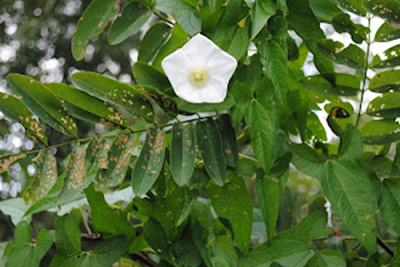I noticed a few weeks ago that I am in reach of 300 wildflowers photographed and identified from West Virginia in one year. My last post took the count to 278, so now, in the waning weeks of the season, I am scouring the fields and forests around my home. I never really expected to hit 300, but now that I am close, I intend to make an effort to reach that goal.
When I say scouring, I literally mean scouring. I am poking in the edge of fields, walking creek and river banks and sloshing through wet areas. While laying down to photograph a beautiful Slender Ladies Tresses (to be posted later with other varieties), I discovered a new flower for me; Reclining St Andrews Cross. While researching fall flowers I came on an account of Gold Crownbeard and Wingstems and remembered a flower I thought was a ragged looking sunflower relative. I went back and found it and was able to ID it as a Crownbeard from its leaves which are opposite.
I also am trying hard to identify the various Goldenrods. I know I have seen at least four distinct varieties but they are difficult to pin down.
This plant is known as Lambsquarter and there is some confusion on its status as a native or introduced. What was interesting here was the ants that were tending to aphids on the stems. The ants gather honeydew produced by the ants and the aphids in return are protected by the ants.
Most of the following were from a slog through the swampy, murky and muddy sections around the farm here.
 |
#286- Devils Beggar-tick
I remember the seeds that stick to your clothes rather than this nondescript
flower on the purple stems |
 |
| #287-Silky Bush Clover |
 |
#291- Purplestem Aster
All of the other blue flowered Asters around were much
smaller than this one. The Purple on the stems, the seven foot tall plant, the
very wet footprint and the stiff hair on the stems makes this one
Purplestem Aster. |
 |
#292- Canada Goldenrod
While
reading up on this one, I found a fact sheet from the country of Latvia. It
seems that Canada Goldenrod is an invasive species introduced to Europe from
North America before the year1645 as an ornamental. |
 |
#293- Crooked-stem Aster The spoon shaped leaves that narrow at stem,
almost winged, and clasping,
the stem that turns purple with age and the stem that changes direction
at every leaf node, identifies this as Crooked-stem Aster |
.JPG)



.JPG)
.JPG)












My Word, Charles! You really found some uncommon ones! Good luck on the 300 -- cold weather is just around the corner...
ReplyDeleteJim Fowler, Greenville, SC